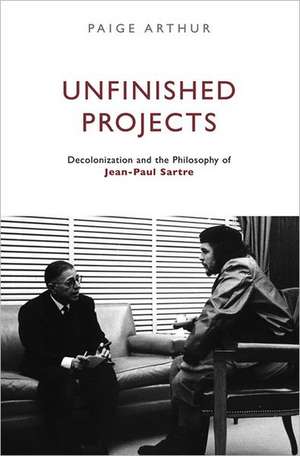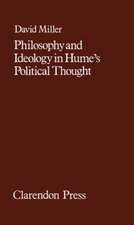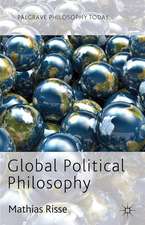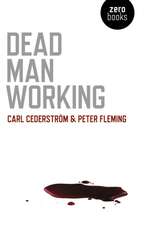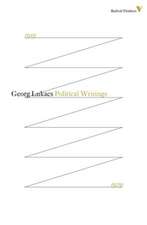Unfinished Projects: Decolonization and the Philosophy of Jean-Paul Sartre
Autor Paige Arthuren Limba Engleză Paperback – 28 feb 2010
Closely following the postwar movements for decolonization, and then supporting the war of independence in Algeria, Sartre proposed an influential and uncompromising view of imperialism. Analyzing the Western attitude to the ‘subhuman’ colonial subject, he offered an account of the social constraints that applied to both ruler and ruled, and came to argue that political violence—on both sides—was a systematic consequence of the colonial order. Arthur’s rich and nuanced book locates Sartre within the political discussions of his time, whilst also looking forward to contemporary debates about new forms of imperialism and resistance.
Preț: 145.02 lei
Nou
Puncte Express: 218
Preț estimativ în valută:
27.75€ • 29.05$ • 22.96£
27.75€ • 29.05$ • 22.96£
Carte tipărită la comandă
Livrare economică 05-19 aprilie
Preluare comenzi: 021 569.72.76
Specificații
ISBN-13: 9781844673995
ISBN-10: 1844673995
Pagini: 233
Dimensiuni: 167 x 235 x 20 mm
Greutate: 0.41 kg
Editura: VERSO
Locul publicării:United Kingdom
ISBN-10: 1844673995
Pagini: 233
Dimensiuni: 167 x 235 x 20 mm
Greutate: 0.41 kg
Editura: VERSO
Locul publicării:United Kingdom
Notă biografică
Paige Arthur is Deputy Director of Research at the International Center for Transnational Justice. She has taught at both UC Berkeley and the New School University.
Recenzii
“In this innovative and exciting book, Paige Arthur recasts the story of twentieth-century intellectual life by retrieving its global contexts and shattering convenient myths... Sartre’s anticolonialism proves in Arthur’s sophisticated rendition far richer and more complex than snide dismissals of his ‘totalitarian’ impulses have allowed.”—Samuel Moyn, Columbia University
“Arthur’s insightful and careful exposition of Sartre’s anti-colonial trajectory from 1945 constitutes a powerful corrective to revisionist interpretation of his ‘Third Worldism.’”—Times Literary Supplement
“In this fine book Paige Arthur systematically examines from a fresh perspective a second political engagement of Sartre’s: as a critic of colonialism and neo-colonialism and as a supporter of Third World liberation struggles.”—Joseph G. Peschek, New Political Science
"In this innovative and exciting book, Paige Arthur recasts the story of twentieth-century intellectual life by retrieving its global contexts and shattering convenient myths... Sartre's anticolonialism proves in Arthur's sophisticated rendition far richer and more complex than snide dismissals of his 'totalitarian' impulses have allowed."--Samuel Moyn, Columbia University"Arthur's insightful and careful exposition of Sartre's anti-colonial trajectory from 1945 constitutes a powerful corrective to revisionist interpretation of his 'Third Worldism.'"--"Times Literary Supplement""In this fine book Paige Arthur systematically examines from a fresh perspective a second political engagement of Sartre's: as a critic of colonialism and neo-colonialism and as a supporter of Third World liberation struggles."--Joseph G. Peschek, "New Political Science"
“Arthur’s insightful and careful exposition of Sartre’s anti-colonial trajectory from 1945 constitutes a powerful corrective to revisionist interpretation of his ‘Third Worldism.’”—Times Literary Supplement
“In this fine book Paige Arthur systematically examines from a fresh perspective a second political engagement of Sartre’s: as a critic of colonialism and neo-colonialism and as a supporter of Third World liberation struggles.”—Joseph G. Peschek, New Political Science
"In this innovative and exciting book, Paige Arthur recasts the story of twentieth-century intellectual life by retrieving its global contexts and shattering convenient myths... Sartre's anticolonialism proves in Arthur's sophisticated rendition far richer and more complex than snide dismissals of his 'totalitarian' impulses have allowed."--Samuel Moyn, Columbia University"Arthur's insightful and careful exposition of Sartre's anti-colonial trajectory from 1945 constitutes a powerful corrective to revisionist interpretation of his 'Third Worldism.'"--"Times Literary Supplement""In this fine book Paige Arthur systematically examines from a fresh perspective a second political engagement of Sartre's: as a critic of colonialism and neo-colonialism and as a supporter of Third World liberation struggles."--Joseph G. Peschek, "New Political Science"
